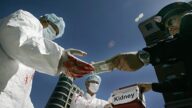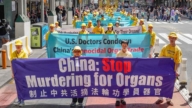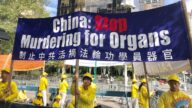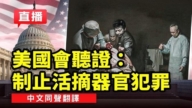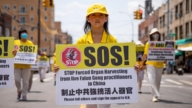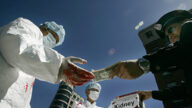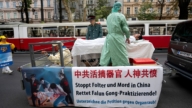【新唐人2013年07月09日訊】「中國紅十字會」再爆醜聞。紅會作為官方規定的器官捐獻第三方監督機構,握有器官捐獻資源。但是,當移植醫院希望從紅會獲取捐獻訊息時,紅會卻要求醫院捐款。醫院認為,地方上的紅會對捐款賬目沒有做到公開,有為自己牟利之嫌。不過,評論認為,醫院和紅會都不乾淨,都在利用器官移植牟利。
7月8號,大陸媒體報導說,廣州軍區廣州總醫院的器官獲取組織,最近跟深圳紅會在器官捐獻方面的合作進入「霜凍期」。近幾個月來,醫院沒有從深圳紅會那兒,得到潛在的器官捐獻者信息。醫院的一名工作人員告訴媒體,這可能和他們醫院停止捐款有關。他說,深圳紅會憑藉所掌握的潛在捐獻者信息,要求醫院捐款。但是令人感到不滿的是,醫院捐款的用途明細,深圳紅會從未公開過。
中國試點人體器官捐獻已3年有餘,至今,捐獻率不足百萬分之一。目前,每年約有30萬人等待器官移植,但每年僅有約1萬人可以獲得器官,並接受移植手術。
據了解,各地的移植費用不盡相同。去年,廣州中山一院一名剛做完移植手術的病人告訴媒體記者,他的整個醫療費用為100多萬。而在南京,每例肝移植,費用為十幾萬元,但在一些地方,可能是四、五十萬元。
深圳紅會副會長趙麗珍對媒體表示,一樁器官移植案例,受益最大的是移植醫院,因此,醫院應該從患者的手術費等費用中拿出一部分利潤,來支付捐獻者的醫療欠費。
而醫院方面同樣指責「紅會」從器官移植當中牟利。廣州一家移植醫院的工作人員表示,深圳紅會提供器官捐獻者的信息,有具體的價格標準,平均每一例為10萬元。「但這筆錢具體怎麼用,社會並不知情。」
深圳家庭教師孟醒表示,醫院和「紅會」都在利用器官移植牟利。
孟醒:「移植一個器官幾十萬,實際醫療花費能花費那麼多嗎?我感覺是不能。如果這個器官又不收錢,手術費能有那麼多嗎?大不了就是做三次、兩次。你看網上說的是紅會,紅會有強制捐款,你捐了款,我才給你這個信息。肯定它也是牟利的。」
中國勞動關係學院教授王江松指出,紅會有做無本生意的傳統。他說,公民免費獻血給紅會,紅會再賣給醫院,但病人用血的時候還要掏錢。而它有這樣的特權,因為它是中共屬下唯一的所謂慈善機構。
王江松:「在他們體制內肯定是合法的一個壟斷權,他們怎麼給的﹖通過甚麼文件立法法律給的﹖我就不清楚。但是我相信他們是官方賦予他們這個權力了。」
據了解,中共在建立器官捐獻體系時,引入紅會作為第三方機構,讓紅會承擔器官捐獻登記和見證等職能,表面上是為了杜絕器官捐獻淪為交易。
但是,捐獻者出於善心無償捐出的器官,卻淪為他人賺錢的工具。
這次大陸醫院跟紅會之間,因器官移植盈利鏈條上的利益分配矛盾而互相指責,也撕開大陸器官移植亂象的黑幕一角。
與此同時,當一個人躺在醫院的病床上,而醫院可能已經盯上了他的器官,這個時候醫生到底是會救命還是謀財害命?
王江松:「中國現在是沒有底線了。甚麼事情都可能發生。真的,甚麼駭人聽聞的事情都有可能發生。現在我們中國人的確處在一種普遍的恐懼和不安之中。的確是,因為現在出現的事情太多了。人們都有不安全感。」
根據追查迫害法輪功國際組織的調查報告,廣州軍區總醫院泌尿外科主任朱雲松曾經親口承認,他們盜取法輪功學員的身體器官,作為器官移植的來源供體。
採訪編輯/秦雪 後製/李月
Conflicts with China’s Red Cross and Hospitals Reveal Dark Profits on Organ Transplants
Another scandal involving the Red Cross Society of China
(RCSC) has just been revealed.
The RCSC is the officially prescribed third party for overseeing
China’s organ donations, they thus own organ donation resources.
Yet, when China’s hospitals ask the RCSC for donor information,
the RCSC demands that hospitals donate money.
Hospitals accuse the RCSC for not having transparent accounts,
and suspect that the RCSC has been making profits.
Commentators say that neither the RCSC nor hospitals
are clean, and they are all making profits from organ transplants.
On July 8, Chinese media said cooperation between
the organ procurement organization of Guangzhou
Military District’s General Hospital, and Shen Zhen
City’s RCSC recently entered a “freezing period.”
The hospital hasn’t received information
regarding potential organ donors for several months.
A hospital staff told the media that this might be related
to the ceasing of donation to the RCSC from the hospital;
The hospital is not happy that the RCSC never releases
details on its use of donations.
China’s pilot organ donation program
has been running for over three years.
So far, the donation rate is less than one in a million.
Currently, about 300,000 people wait for organ transplants
each year, but only around 10,000 can get an organ.
Organ transplant costs varies by area.
Last year, a patient who received an organ transplant at
Guangzhou’s Zhongshan Hospital told the media that
his medical expenses totaled over 1 million yuan ($163,000).
In Nanjing, each liver costs about 100,000 yuan ($16,300).
In other areas it’s about 400,000 or 500,000 yuan
($65,000-$81,000).
Zhao Lizhen, Vice Chairman at Shen Zhen’s RCSC says
hospitals get the highest profit for organ transplants.
Thus, hospitals should use some of its profits
to pay for the debts of the donors.
Hospitals accuse the RCSC of making profit from transplants.
One employee at an organ transplant hospital in Guangzhou
says the RCSC in Shen Zhen charges 10,000 yuan ($1,600) for information on each donor,
with no clear information on what this money will go towards.
Meng Xing, a tutor in Shen Zhen says that both hospitals
and the RCSC make profit from organ transplantations.
Meng Xing: “Transplants costs hundreds of thousands of yuan,
but are the actual medical expenses so high? I don’t think so.
The organ is free, and so the operation shouldn’t cost so much.
The RCSC forces them to donate.
So it for sure also makes a profit.”
Wang Jiangsong, Professor at the China Institute of Industrial
Relations, says the RCSC always groundlessly makes profits.
He says, people donate blood to the RCSC for free, and
the RCSC then sells blood to hospitals, who charge patients.
It has the privilege of being the only charity organization
under the leadership of the Chinese Communist Party (CCP).
Wang Jiangsong: “It’s a legal monopoly under its system.
What is the legal base? I am not so clear.
I believe its privilege was given by the authorities.”
It’s known that when the CCP established
its organ donor system,
the RCSC was introduced as the third-party organization
to register and validate organ transplants,
in order to superficially stop organ donation as a business.
Volunteer donors donated their organs with good intentions,
but it has become other people’s resource to make a profit.
This conflict and exposure between China’s hospitals
and the RCSC over allocation of profits from organ transplants
also reveals a corner of the dark scene.
Meanwhile, when someone is on a hospital bed,
the hospitals might plan on using his organs.
Are doctors saving people or killing people?
Wang Jiangsong: “There is no bottom line in China.
Anything could happen.
It really is that anything horrible could happen.
We Chinese indeed are in a state of fear and insecurity.
So many things have happened.
People don’t get a sense of security.”
According to World Organization to Investigate the
Persecution of Falun Gong,
Zhu Yunsong, Urologic Surgery Chairman at Guangzhou
Military General Hospital, admitted and said
they steal Falun Gong practitioners organs, using them
as a source for organ transplants.


